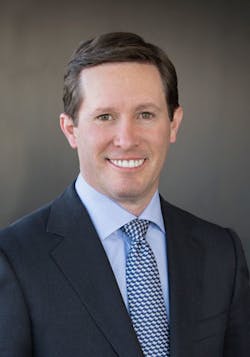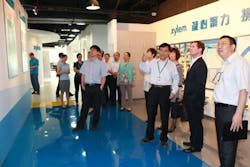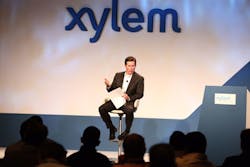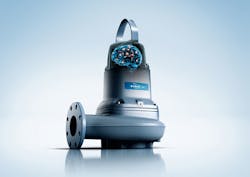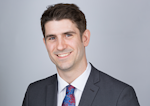Brexit, Boris & Water 4.0: Xylem's CEO on the Record
In a landmark acquisition, water treatment company Xylem bought metering company Sensus for $1.7 billion. What does the company look for when it acquires a new business? How is it diversifying to become less of a pump-centric organisation? WWi catches up with CEO and president, Patrick Decker in Singapore.
By Tom Freyberg
Tom Freyberg, chief editor of WWi magazine (TF): Hi Patrick I want to talk to you about Singapore, which is known as a hydro hub. Is Xylem still seeing it this way?
Patrick Decker, CEO and president, Xylem (PD): As you know I’ve always been a believer that necessity is the mother of all invention and water is a national security issue here in Singapore, given their water treaty with Malaysia. They are constantly re-inventing themselves in terms of how they drive down water losses and non-revenue water. It’s a big theme for Singapore but also they are leaders in water reclamation, water re-use, which is a big focus for us as well. So you absolutely continue to see a lot of innovation here.
TF: I also think in Singapore there’s still contracts to be won. We are hearing about the fourth and fifth desalination plants, as well as water reclamation facilities as part of DTSS (Deep Tunnel Sewerage System) Phase 2, so it looks as if there is still plenty of work to be won here for the international companies?
PD: Absolutely. This is one of our fastest growing regions so as I look around the world, about 15% of our total revenue as a company is generated from greater Asia Pacific and Middle East. We see that pretty consistent across the region, whether it’s the ASEAN countries, where Singapore really is a thought leader - they really are a technology reference across the region - but we see booming business in India, the work that Prime Minister Modi is doing in terms of the Ganges river clean up and the Smart Cities initiative. The fact that in China this is a top policy issue in terms of environmental quality and water quality. So even though you hear all of this stuff about the doomsday, the end of the world in China, the reality is two thirds of our revenue comes from the wastewater sector and public utilities and we continued to see double digit growth there, throughout this so called crisis in China and so I always take the long view.
TF: I was in Shanghai a couple of weeks ago and there is a big emphasis on the Water Ten plan. So while there’s been years of industrialisation and you see the media reports on pollution, now I think the government is really taking quite a hard stance on this.
PD: Absolutely. I was there soon after that initiative came out and met with quite a number of water utilities but also large industrial users of water that quite frankly, historically did not consider water to be core to their operation. They were certainly trying to be compliant but they didn’t understand the importance of efficacy of treatment. So you can imagine going in there as a water company that has both the pumping capability, the testing capability, the treatment capability with customers that, quite frankly, were quite scared but didn’t know exactly how to deal with this issue. That really opened up a series of wonderful conversations and it is spurring a lot of investment in the country.
I would say a second issue is the expansion into tier two and tier three cities. We are carrying out a lot of work right now on doing more localisation of our products and designs, in other words fit for purpose in China in those cities. We’ve made some significant expansion at our China factory in Shinyang, as well as in Nanjing and we really think that’s spurring some of our growth in China. I’m very bullish on China and we are really developing the products that are fit for purpose in that market. But it’s not without challenges.
TF: You mention there that you’re expecting a 15% of the business to come from the Asia region?
PD: Asia and Middle East.
TF: So you think from the increased manufacturing in China you could see this increase?
PD: Yes. We’ve got really strong local manufacturing base in China. We have a strong manufacturing base in India. We also have strong manufacturing in the Middle East, now that we are actually building in the region. We have a greenfield site there that we’re opening up later this year. And all that together we are confident that we are going to be able to at least triple that business over the next three to five years. There’s a lot of big contracts that we are bidding on right now. And I’ve always said, in order to win big contracts you have to win big contracts.
TF: I see you are expecting a 1% growth rate from acquisitions and companies you’re looking to buy in the market. So my question is what are you looking for, in terms of start-ups and new companies?
PD: Well the 1% is this year. So we already have in our pocket 1% growth coming from the two acquisitions that we did, coming from the first quarter of last year, first quarter of this year. Those two both happen to be focused on what we refer to as the outdoor, or surface water area so think about lakes, rivers, dams, streams, ocean coastal where our analytics offering, or getting into big data is very important for our customers, quality, water resilience.
That’s going to continue to be an area of focus for us. We think it’s a really fragmented sector and it really serves as a proxy for R&D for us because there’s a lot of IP that already exists out there. So rather than us trying to develop it ourselves it’s often better to partner with someone else. So that’s going to continue to be an area of focus.
I would say we will continue to use mergers and acquisitions as a proxy for R & D on building out smart wastewater networks with our Flygt offering and our great customer relationships there. We’re already connecting our flight pumps into the SCADA systems of our customers and gathering a lot of data - not always of the highest quality so building that data analytics capability is going to be important.
And then I would say also in the clean water network where we place somewhat today, there are great opportunities I think, from an M&A standpoint. We’re going to be disciplined. It would be very tempting to over pay. These are high multiple kind of businesses if you don’t go about it in the right way.
So we’re going to be disciplined around that, but as you probably saw in our investor day late last year we’ve got a very solid arsenal from a cashflow standpoint and a balance sheet standpoint to be able to play where it makes sense for us to play. And that was always one of the primary themes of Xylem coming out of ITT, was to say there is a role for a natural integrator in certain areas of the water space to play.
TF: You mentioned the quality of data and at the IFAT show your team showed me your new smart pump, which can detect where there are potential clogs and that ties in with data. I want to ask you about industry 4.0 - someone told me they’re calling it water 4.0. Is this something that is genuinely going to stay or is it a fad?
PD: I am adamant on this. It’s here to stay. I think there’ll be different rates of adoption around the world. I think that we are going to go through a period of time here, like any industry is, as to what is quality data, what is not so quality data? What do you do with it? Is it owned by the customer or is it owned by the service or equipment provider?
So it’s not going to be easy. I think there will always be a challenge in terms of: what’s the value proposition - and how do you monetise that? And there will always be a temptation for it to be more of a commodity and so I think that’s just something we all have to work through.
At the end of the day I look at it and say if you’re creating a better value proposition to your customer by helping them better solve problems that they either knew they had or they didn’t even know they had, you’ll sort through the economics. You’ll figure out a way. That will follow.
I think that the idea of somehow the possibility of staying in an environment where we have dumb networks doesn’t make any sense to me when a lot of other industries are moving in that direction.
One of the things that we are very focussed on right now, we brought on board a dedicated innovation technology officer - Jayanthi Iyengar. I purposely brought her from outside the water industry because we have a lot of the water knowledge inside our company already but what I wanted was someone who had come in from industries that had experienced disruptive business models and really understood where that could come from.
One of the areas that we’re focussed on now is we don’t need to own all the R&D and innovation technology development inside the four walls of Xylem. We can build an ecosystem - an overused word but an ecosystem of people around us, academia, commercial partnerships, venture capital funds, start ups, where it could be more of a shared economy. It doesn’t have to be capital intensive and it doesn’t have to be asset intensive.
TF: So you’re talking more collaboration with universities, academics, not necessarily under the Xylem umbrella but part of a wider Xylem network?
PD: That’s correct. I came out of health care, from years ago and we would never have afforded all of the R&D we wanted to do in terms of new product development, nor did we need to, because you could rely on academia, you could rely on start ups, you could rely on other think tanks that are out there. But you’ve got to be able to bring some substance to the table. And at the end of the day, to me, that’s the power of Xylem. It’s not unique to us. But we certainly have as much, if not more, than anybody does in terms of subject matter expertise that we can bring to the table.
TF: I want to talk to you about Brexit. What does this mean to Xylem, as part of the wider European economy and the EU single market? Is this going to have an impact on your European figures?
PD: More than two thirds of our revenue in the UK is tied to water utilities and the wastewater side of the market. You’re very familiar with the AMP cycle and while there could be some kind of movement in that, at the end of the day I’ve been impressed over time with how deeply committed the government is to that programme so two thirds of our business in the UK is not going to be affected at all.
I would say the remainder of that, there’s some uncertainty as to what happens in our industrial client base, commercial buildings. There could be some slowdown there. I think it’s anybody’s guess as to what that’s going to look like. I think the real impact for us across Europe would be if there was a knock on effect in terms of currency valuation but that would not be from an economic impact it would be purely currency translation, reporting.
We are a dollar denominated company - so you deal with that. Our business across Europe is largely localised at a country level. We’ve got a few regional players that might have some impact but not to a large degree.
TF: I think it will be a period of uncertainty, especially politically, with the new female Prime Minister coming into office as well.
PD: It helps to have certainty as to who your leader is and who’s going to be negotiating the exit.
TF: If we’re sat here two years from now in the next Singapore International Water Week 2018 what can we expect to see from Xylem, what changes are you anticipating over the next two years?
PD: I think if it all goes to plan, and I always say there’s a caveat because the world changes and things evolve. I think there are a few things that you will see have evolved in a couple of different areas. One, you’ll see that our presence in various critical emerging markets, certainly in Asia and the Middle East, will be even stronger and larger than what they are today because of some of the investments we’re making there.
I think that you will see a Xylem team that will be two years older of having been a company together and you’ll see even more of a unified front. And I’m so impressed by what I’ve seen over the last two years since the spin out from ITT. These things take time to build a brand and a company recognition. I think we’re making a lot of progress in that regard. You see that here in Singapore and other areas around the world.
In terms of the technologies and the solutions we bring to our customers, we will be much more down the line in terms of Industry 4.0. I think you will also see that the acquisitions that we will have done and brought to market will continue to be moving up the technology curve and we will be even less of a pump-centric company.
I love our pump businesses, they are unassailable franchises and a great foot in the door. But we’ve got so much more to offer beyond that and we will continue to augment our portfolio with other value propositions for our customers.
- Tom Freyberg is chief editor of WWi.magazine.
Sensus Acquisition
In a headline acquisition, global water company Xylem will buy metering firm Sensus for $1.7 billion in cash. Xylem said it expects to achieve $50 million annually from the buy within three years of closing the deal. Sensus is owned by investment funds affiliated with the Jordan Company and GS Capital Partners 2000 and has more than 80 million metering devices installed globally. The company has over 3000 employees globally and in 2016 generated nearly 70% of revenues in the US. Decker said the advanced metering infrastructure segment is growing at nearly twice the rate of the total metering space.
The acquisition demonstrates how companies involved in the traditional water treatment markets, such as pumps, aeration and UV, are diversifying into the smart infrastructure space.
More Water & WasteWater International Archives Issue Articles
